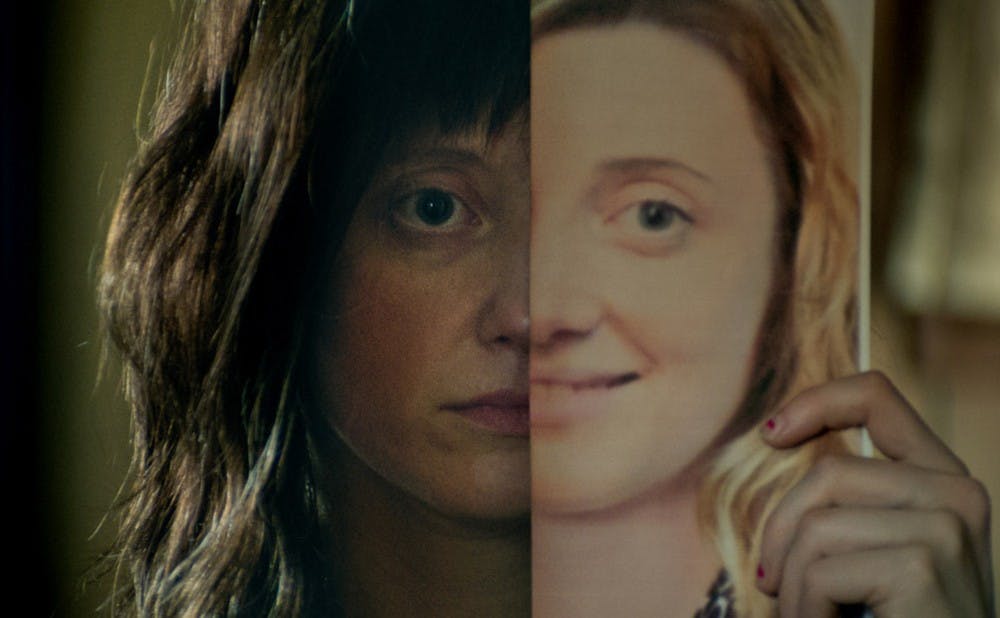A gloomy day in a moldering town is seen through the lens of a 4:3 aspect ratio, introducing us to the gaunt, borderline lethargic 30-something-year-old woman, Nancy (Andrea Riseborough). Everything about the scenes in the introductory half of the film reflects Nancy’s misery — from the crumbling shopping malls to the dimly-lit diner. Director Christina Choe establishes Nancy as a liar from the beginning, not in a malicious capacity, but rather as someone who is lost and perhaps misunderstood.
Choe’s “Nancy” is upsetting. You want to trust Nancy, but you’re not sure that you can. It is easy to relate to Nancy but it’s hard to gauge if she deserves our sympathy. Choe does everything in her power to provoke uncertainty in her award-winning feature film debut, which premiered at Sundance Film Festival.
Nancy’s life revolves around the falsehoods that she weaves. Throughout a series of exchanges with internet friend Jeb (John Leguizamo), who wishes to adopt a child, Nancy invents a pregnancy and offers her (nonexistent) child to him. For a while, he is her only friend until he finds out about the fake pregnancy and exits her life. Nancy (presumably) photoshops a photo of herself “vacationing” in North Korea and presents the “evidence” to her skeptical coworkers. She ignores her Parkinson’s-afflicted mother (Ann Dowd) and neglects to fulfill her promise to take her to the doctor, which results in her mother’s death.
So the concept of the unreliable narrator is established in a sense. We do not know what Nancy is thinking or what her motives are; in fact, Nancy reveals little about what she is feeling through the dialogue in the film. She communicates to the audience solely through her emotions or lack thereof. Fixed within her seemingly blank eyes is a world of hurt and confusion, masked by a stoic expression. Although she does not betray much about herself, Nancy’s numbness and passivity reveal that she is not complete as a person, and we are not offered much explanation as to why.
When couple Leo and Ellen (Steve Buscemi and J. Smith-Cameron) appear on the news to discuss their missing daughter Brooke, who was kidnapped from a shopping mall decades ago, Nancy compares herself to a rendering of what Brooke would look like as an adult. When the comparison appears to be a match, she picks up the phone, informing them that she could be their stolen child.
This is the precise moment when the audiences loses sight of what is genuine and what is deception. Choe mobilizes dramatic irony in making the audience privy to Nancy’s previous falsehoods, but now we are left in the dark. Further perplexing, the aspect ratio subtly transitions to 16:9 and the skies turn blue in what seems to be Nancy’s (falsely?) sanguine journey of self-discovery.
The next few days are painful as we wait for the DNA test results to come back. Leo and Ellen are unsure if they should trust Nancy, but reasonable doubts give way to willful belief. As the timid relationship between the couple and Nancy strengthens, one cannot help but to feel that Nancy may truly believe that she is this lost child despite the likelihood that Nancy could be using her uncanny resemblance to Brooke to con the wealthy and emotionally vulnerable pair.
Yet the film has already made it clear that Nancy does not truly belong anywhere. Riseborough’s performance becomes even more alienating as Ellen tucks the strange woman into Brooke’s old bed, as the pronoun “her” metamorphoses into “you,” creating an unsettling touch to Nancy’s uncomfortably sustained presence.
Riseborough's performance is the main attraction as she delivers each minute, yet compelling detail almost effortlessly. Choe tiptoes around the maze that is Nancy’s warped and disturbed psyche and leaves us disoriented with even more questions than we started with. Themes of class inequality and identity are lightly touched upon without explicit commentary, as Choe allows the camera and Riseborough to do much of the “talking.”
“Nancy” is profoundly piteous. She is a liar, but we cannot help but believe her. Nothing is resolved, and she gains nothing from her actions. Perhaps the lies are all she has, burying themselves so deep into her routine that lying has become second nature, nothing more than a survival mechanism to escape her bleak life. One thing is certain: We can never know for sure.
Get The Chronicle straight to your inbox
Signup for our weekly newsletter. Cancel at any time.

